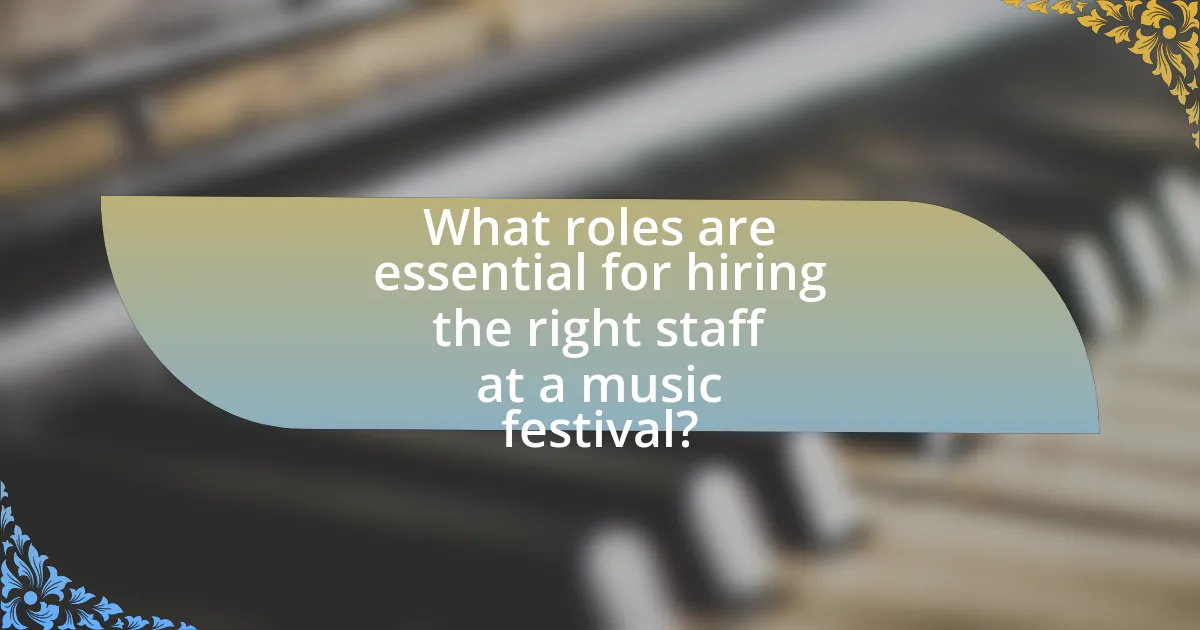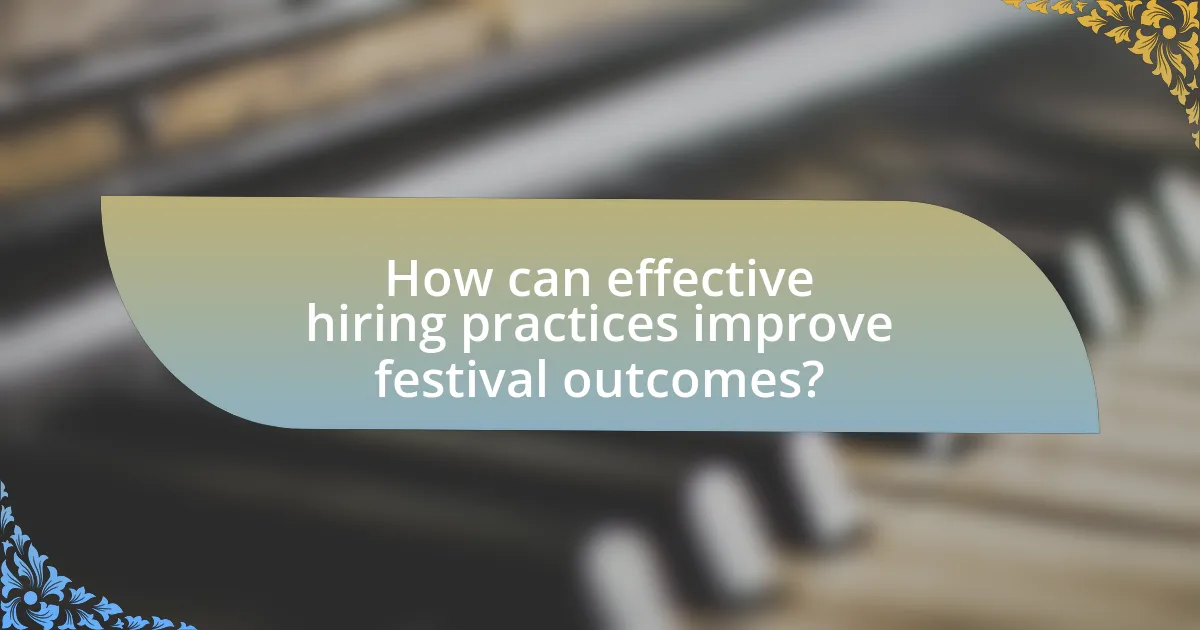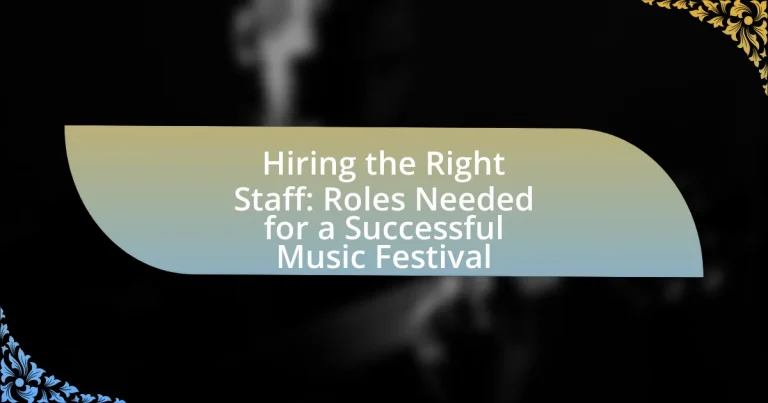The article focuses on the essential roles required for hiring the right staff at a music festival, emphasizing the importance of event coordinators, security personnel, ticketing staff, stage managers, and volunteers. It outlines how these roles contribute to the festival’s success by ensuring efficient operations, enhancing attendee experience, and maintaining safety. The article also discusses the specific responsibilities associated with each role, the impact of hiring decisions on festival outcomes, and best practices for attracting and selecting suitable candidates. Additionally, it highlights the significance of cultural fit and experience in the music industry when making hiring choices.

What roles are essential for hiring the right staff at a music festival?
Essential roles for hiring the right staff at a music festival include event coordinators, security personnel, ticketing staff, stage managers, and volunteers. Event coordinators oversee logistics and ensure smooth operations, while security personnel maintain safety and manage crowd control. Ticketing staff handle entry and sales, and stage managers coordinate performances and technical requirements. Volunteers assist in various capacities, providing essential support throughout the festival. Each role contributes significantly to the overall success and safety of the event, ensuring a positive experience for attendees and performers alike.
How do these roles contribute to the overall success of the festival?
The roles within a music festival contribute to its overall success by ensuring efficient operations, enhancing attendee experience, and maintaining safety. For instance, event coordinators streamline logistics, which minimizes delays and maximizes enjoyment for attendees. Security personnel ensure a safe environment, allowing guests to focus on the performances. Additionally, marketing teams attract a larger audience, directly impacting ticket sales and revenue. According to a study by the Event Marketing Institute, effective staffing can increase attendee satisfaction by up to 30%, demonstrating the critical impact of these roles on festival success.
What specific responsibilities does each role entail?
Each role in organizing a successful music festival entails distinct responsibilities. For example, the Festival Director oversees the entire event, managing budgets, timelines, and team coordination. The Production Manager is responsible for logistics, including stage setup, sound, and lighting, ensuring technical aspects run smoothly. The Marketing Coordinator handles promotional activities, social media engagement, and ticket sales to maximize attendance. The Volunteer Coordinator recruits and manages volunteers, assigning tasks and ensuring they are trained. Each role is crucial for the seamless execution of the festival, contributing to its overall success through specialized functions.
How do these responsibilities impact the festival experience for attendees?
The responsibilities of staff at a music festival significantly enhance the overall experience for attendees. Effective management of roles such as security, customer service, and logistics ensures a safe, enjoyable, and seamless event. For instance, trained security personnel maintain safety, allowing attendees to enjoy performances without concern, while customer service staff address inquiries and resolve issues promptly, contributing to a positive atmosphere. Additionally, efficient logistics management, including crowd control and timely scheduling, minimizes delays and enhances accessibility, directly impacting attendee satisfaction. These responsibilities collectively create an organized environment that fosters enjoyment and engagement, ultimately leading to a memorable festival experience.
Why is it important to hire the right staff for a music festival?
Hiring the right staff for a music festival is crucial because it directly impacts the event’s overall success and attendee experience. Competent staff ensures efficient operations, safety, and high-quality customer service, which are essential for maintaining a positive atmosphere. For instance, according to a study by Eventbrite, 70% of festival-goers cite staff interactions as a key factor in their enjoyment of the event. Properly trained personnel can manage crowd control, provide assistance, and handle emergencies effectively, thereby minimizing risks and enhancing the festival’s reputation.
What are the potential consequences of hiring the wrong staff?
Hiring the wrong staff can lead to significant operational inefficiencies and negative impacts on event success. Ineffective employees may cause delays in planning and execution, resulting in poor attendee experiences and potential financial losses. For instance, a study by the Society for Human Resource Management indicates that a bad hire can cost a company up to five times the employee’s salary when considering recruitment, training, and lost productivity. Additionally, hiring individuals who lack the necessary skills can lead to safety issues, especially in high-stakes environments like music festivals, where crowd management and emergency response are critical.
How can the right staff enhance the festival’s reputation?
The right staff can enhance a festival’s reputation by providing exceptional service and creating a positive attendee experience. When staff members are well-trained, knowledgeable, and enthusiastic, they contribute to smooth operations, which leads to higher satisfaction among festival-goers. For instance, a study by Eventbrite found that 78% of attendees consider staff friendliness and professionalism as key factors in their overall enjoyment of an event. Additionally, positive interactions with staff can lead to word-of-mouth promotion, further elevating the festival’s image in the community and among potential attendees.
What factors should be considered when hiring staff for a music festival?
When hiring staff for a music festival, key factors include relevant experience, skill sets, and the ability to work under pressure. Relevant experience ensures that staff are familiar with the unique demands of festival environments, such as crowd management and safety protocols. Skill sets should align with specific roles, such as technical expertise for sound engineers or customer service skills for ticketing and information staff. The ability to work under pressure is crucial, as festivals often involve high-stress situations and require quick decision-making. Additionally, background checks and references can validate the reliability and professionalism of potential hires, ensuring a safe and enjoyable experience for attendees.
How does experience in the music industry influence hiring decisions?
Experience in the music industry significantly influences hiring decisions by providing candidates with relevant skills, industry knowledge, and established networks. Employers prioritize applicants with a proven track record in music-related roles, as this experience often correlates with a deeper understanding of the industry’s dynamics, including event management, artist relations, and audience engagement. For instance, a study by the Music Industry Research Association found that 75% of hiring managers consider prior industry experience as a critical factor when selecting candidates for roles in music festivals. This emphasis on experience ensures that hires can navigate the complexities of the music environment effectively, leading to more successful event outcomes.
What role does cultural fit play in the hiring process?
Cultural fit plays a crucial role in the hiring process by ensuring that new employees align with the values, beliefs, and behaviors of the organization. This alignment enhances team cohesion, improves employee satisfaction, and increases retention rates. Research indicates that companies with strong cultural fit experience 30% higher employee retention, as individuals who resonate with the company culture are more likely to stay long-term. Additionally, a study by the Harvard Business Review found that cultural fit can lead to a 50% increase in job performance, as employees who share the organization’s values are more engaged and motivated. Therefore, prioritizing cultural fit in hiring contributes significantly to the overall success and stability of the workforce, particularly in dynamic environments like music festivals.

What are the key roles needed for a successful music festival?
Key roles needed for a successful music festival include event management, production, marketing, security, and vendor coordination. Event management oversees the overall planning and execution, ensuring all elements align with the festival’s vision. Production teams handle technical aspects such as sound, lighting, and stage setup, which are crucial for artist performances. Marketing professionals promote the festival to attract attendees, utilizing social media and traditional advertising methods. Security personnel ensure the safety of attendees and artists, managing crowd control and emergency situations. Vendor coordination involves managing food, beverage, and merchandise providers, which enhances the festival experience. Each role is essential for creating a seamless and enjoyable event, as evidenced by successful festivals that prioritize these functions.
What are the primary operational roles required?
The primary operational roles required for a successful music festival include event manager, production coordinator, logistics manager, and volunteer coordinator. The event manager oversees the entire festival, ensuring all aspects run smoothly, while the production coordinator handles technical elements such as sound and lighting. The logistics manager is responsible for the transportation and setup of equipment, and the volunteer coordinator manages the recruitment and training of volunteers. These roles are essential as they contribute to the seamless execution of the festival, ensuring that all operational aspects are effectively managed.
What does the role of a festival director involve?
The role of a festival director involves overseeing the planning, execution, and management of a music festival. This includes coordinating logistics, managing budgets, securing permits, and ensuring compliance with regulations. The festival director also collaborates with artists, vendors, and sponsors to create a cohesive event experience. According to the National Association of Music Merchants, effective festival directors possess strong leadership skills and experience in event management, which are crucial for navigating the complexities of large-scale festivals.
How does the production manager ensure smooth operations?
The production manager ensures smooth operations by coordinating all aspects of the festival’s logistics, including scheduling, resource allocation, and communication among staff. This role involves creating detailed timelines and checklists to ensure that each phase of the festival runs according to plan. For instance, the production manager often utilizes project management software to track progress and address any issues in real-time, which minimizes delays and enhances efficiency. Additionally, by conducting regular meetings with team members and stakeholders, the production manager fosters a collaborative environment that allows for quick problem-solving and adaptability to unforeseen challenges.
What are the essential roles in artist management?
The essential roles in artist management include the artist manager, booking agent, publicist, and tour manager. The artist manager oversees the overall career strategy, ensuring the artist’s goals align with market opportunities. The booking agent is responsible for securing performance opportunities and negotiating contracts, which directly impacts the artist’s income and exposure. The publicist manages the artist’s public image and media relations, crucial for maintaining a positive reputation and increasing visibility. The tour manager coordinates logistics during tours, ensuring smooth operations and addressing any issues that arise on the road. Each role is vital for the artist’s success, as they collectively contribute to career development, financial stability, and public perception.
What responsibilities does an artist liaison have?
An artist liaison is responsible for facilitating communication between artists and event organizers. This role includes coordinating logistics such as travel, accommodations, and technical requirements for performances. Additionally, the artist liaison ensures that artists’ needs are met during the event, addressing any issues that arise and providing support to enhance the artists’ experience. The effectiveness of an artist liaison is crucial for maintaining positive relationships between artists and festival management, which can lead to successful performances and future collaborations.
How does a booking agent contribute to the festival lineup?
A booking agent contributes to the festival lineup by securing artists and negotiating performance contracts. They leverage industry connections to identify suitable acts that align with the festival’s theme and audience preferences. Booking agents also manage logistics, ensuring that artists’ requirements are met, which enhances the overall quality of the lineup. Their expertise in market trends and artist popularity helps festivals attract attendees, as evidenced by the fact that festivals with well-curated lineups often see increased ticket sales and higher attendance rates.
What roles are critical for audience engagement and safety?
Critical roles for audience engagement and safety at a music festival include event coordinators, security personnel, and medical staff. Event coordinators facilitate audience interaction through programming and activities, ensuring a vibrant atmosphere. Security personnel maintain safety by managing crowd control and responding to emergencies, which is essential for preventing incidents. Medical staff provide immediate care for health-related issues, ensuring the well-being of attendees. These roles collectively enhance the festival experience while prioritizing safety, as evidenced by industry standards that emphasize the importance of trained personnel in managing large crowds effectively.
What does the role of a security manager entail?
The role of a security manager entails overseeing the safety and security operations at events, particularly in environments like music festivals. This includes developing security plans, coordinating with law enforcement, managing security personnel, and ensuring compliance with safety regulations. The security manager is responsible for risk assessment and implementing measures to mitigate potential threats, which is crucial for maintaining a safe environment for attendees. According to the International Association of Venue Managers, effective security management can significantly reduce incidents and enhance the overall experience at large events.
How do volunteers enhance the festival experience?
Volunteers enhance the festival experience by providing essential support that improves overall attendee satisfaction and operational efficiency. Their presence allows for better crowd management, information dissemination, and assistance at various festival activities, which contributes to a more organized and enjoyable environment. For instance, a study by the National Endowment for the Arts found that events with volunteer involvement reported higher levels of participant engagement and satisfaction, demonstrating the positive impact of volunteers on the festival atmosphere.

How can effective hiring practices improve festival outcomes?
Effective hiring practices can significantly enhance festival outcomes by ensuring that the right individuals are selected for specific roles, leading to improved operational efficiency and attendee satisfaction. When festivals employ rigorous hiring processes, they can identify candidates with the necessary skills and experience, which directly correlates with the quality of services provided. For instance, hiring experienced event coordinators can streamline logistics, while selecting skilled customer service staff can enhance the overall attendee experience. Research indicates that festivals with well-trained staff report higher satisfaction rates among attendees, as evidenced by a study published in the Journal of Event Management, which found that 75% of festival-goers rated their experience positively when staff were knowledgeable and responsive. Thus, effective hiring practices not only optimize the workforce but also contribute to the overall success and reputation of the festival.
What strategies can be employed to attract the right candidates?
To attract the right candidates for a music festival, organizations should implement targeted recruitment strategies such as leveraging social media platforms, collaborating with music industry networks, and offering competitive compensation packages. Social media platforms like Instagram and Facebook allow for targeted ads that reach individuals with specific interests in music and event management, increasing the likelihood of attracting suitable candidates. Collaborating with music industry networks can provide access to a pool of professionals who are already engaged in the field, ensuring that candidates possess relevant experience and passion for the industry. Additionally, offering competitive compensation packages, including benefits and opportunities for professional development, can make positions more appealing, as evidenced by a 2021 survey from Glassdoor, which indicated that 67% of job seekers consider salary and benefits as a top factor in job selection.
How can social media be utilized in the hiring process?
Social media can be utilized in the hiring process by enabling employers to reach a broader audience and engage with potential candidates directly. Platforms like LinkedIn, Facebook, and Twitter allow organizations to post job openings, share company culture, and interact with applicants in real-time. According to a 2021 survey by Jobvite, 79% of job seekers use social media in their job search, highlighting its effectiveness in attracting talent. Additionally, social media can facilitate the screening of candidates by providing insights into their professional backgrounds and personal interests, which can be crucial for roles in dynamic environments like music festivals.
What role do job descriptions play in attracting suitable applicants?
Job descriptions play a crucial role in attracting suitable applicants by clearly outlining the responsibilities, qualifications, and expectations associated with a position. When job descriptions are detailed and specific, they help potential candidates assess their fit for the role, thereby increasing the likelihood of attracting individuals who possess the necessary skills and experience. Research indicates that well-crafted job descriptions can lead to a 50% increase in the quality of applicants, as they provide clarity and set realistic expectations about the job. This specificity not only helps in filtering out unqualified candidates but also enhances the overall recruitment process by aligning the organization’s needs with the candidates’ capabilities.
What are the best practices for interviewing potential staff?
The best practices for interviewing potential staff include preparing structured questions, assessing cultural fit, and utilizing behavioral interview techniques. Structured questions ensure consistency across interviews, allowing for fair comparisons among candidates. Assessing cultural fit is crucial, as it determines how well a candidate aligns with the organization’s values and work environment, which can significantly impact team dynamics and overall success. Behavioral interview techniques, which focus on past experiences and actions, provide insight into how candidates may handle future situations, making them a reliable predictor of job performance. These practices are supported by research indicating that structured interviews can improve predictive validity by up to 50%, enhancing the likelihood of selecting the right candidate for the role.
How can behavioral interview techniques be applied in this context?
Behavioral interview techniques can be applied in the context of hiring staff for a music festival by assessing candidates’ past experiences to predict future performance in specific roles. For instance, interviewers can ask candidates to describe situations where they successfully managed high-pressure environments, which is crucial for festival roles that require quick decision-making and problem-solving skills. Research indicates that behavioral interviews are effective; a study by Schmidt and Hunter (1998) found that structured interviews, including behavioral techniques, have a validity coefficient of 0.51 in predicting job performance. This evidence supports the application of behavioral interview techniques to ensure that candidates possess the necessary skills and experiences for the dynamic environment of a music festival.
What questions should be asked to assess cultural fit?
To assess cultural fit, ask questions that reveal a candidate’s values, work style, and interpersonal dynamics. Effective questions include: “Can you describe a work environment where you thrive?” which helps identify alignment with the organization’s culture; “How do you handle conflict within a team?” to gauge collaboration and conflict resolution skills; and “What motivates you to perform at your best?” to understand personal drivers that align with the company’s mission. These questions are designed to elicit responses that reflect the candidate’s compatibility with the organization’s core values and team dynamics, ensuring a cohesive work environment essential for a successful music festival.
What tips can ensure a successful hiring process for a music festival?
To ensure a successful hiring process for a music festival, it is essential to clearly define roles and responsibilities before beginning recruitment. This clarity helps in identifying the specific skills and experience required for each position, such as stage management, security, and vendor coordination. Additionally, utilizing a structured interview process that includes scenario-based questions can effectively assess candidates’ problem-solving abilities and adaptability in high-pressure environments typical of festivals.
Moreover, leveraging platforms that specialize in event staffing can streamline the hiring process by connecting festival organizers with experienced professionals. According to a study by Eventbrite, 70% of event organizers reported that using specialized staffing services improved their hiring efficiency. Finally, conducting thorough background checks and reference verifications ensures that selected candidates have a proven track record, which is crucial for maintaining safety and quality at the festival.
How can feedback from previous festivals inform hiring decisions?
Feedback from previous festivals can significantly inform hiring decisions by identifying the strengths and weaknesses of past staff performance. Analyzing feedback allows festival organizers to pinpoint which roles were effectively filled and which positions may require more experienced or specialized candidates. For instance, if feedback indicates that sound technicians consistently received praise for their work, hiring decisions can prioritize candidates with similar qualifications and experience. Conversely, if security staff were frequently criticized for their performance, organizers can seek individuals with proven track records in crowd management and safety protocols. This data-driven approach enhances the likelihood of assembling a competent team, ultimately contributing to the festival’s success.
What common pitfalls should be avoided during the hiring process?
Common pitfalls to avoid during the hiring process include inadequate job descriptions, biased candidate evaluations, and neglecting cultural fit. Inadequate job descriptions can lead to attracting unqualified candidates, as they fail to clearly outline the skills and responsibilities required for the role. Biased evaluations can result in overlooking qualified candidates due to unconscious biases, which research shows can affect hiring decisions significantly. Neglecting cultural fit can lead to high turnover rates, as employees who do not align with the organization’s values may leave shortly after being hired. Addressing these pitfalls can enhance the effectiveness of the hiring process and improve overall team cohesion.





